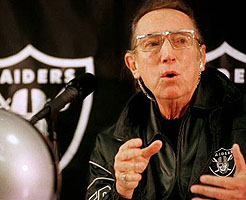

The trial to resolve the dispute between the Raiders and Alameda County has been delayed, a Sacramento County judge announced Nov. 11, 1999.
The trial had been scheduled to start Feb. 15, but that date was vacated by Superior Court Judge Joe Gray. The delay will give both sides additional time to argue various motions. The new trial is expected to begin in April.
At stake is the future home of the Raiders.
Oakland and Alameda County sued the Raiders in September 1997 to honor the remaining time on their 16-year lease at Network Associates Coliseum. The team countersued in July 1998 , claiming the lease is invalid because sellouts were falsely promised before the agreement was signed.
If the city and county win the case, the Raiders are obligated to play in Oakland through the 2010 season. If the Raiders prevail, the current contract would be voided and the team could negotiate a new lease with Oakland or any other city.
Raiders owner Al Davis claims the city and county have failed to honor guarantees made when the franchise returned to northern California in 1995.
During a news conference at the NFL winter meetings in Phoenix last March, Davis (right)  said he was promised that all club seats, suites and personal seat licenses would be sold out at the Oakland Coliseum (since renamed Network Associates Coliseum in 1998). Davis acknowledged that the guarantee for sellouts wasn't included in the lease agreement. He said that city and county officials pledged sellouts in press releases and statements.
said he was promised that all club seats, suites and personal seat licenses would be sold out at the Oakland Coliseum (since renamed Network Associates Coliseum in 1998). Davis acknowledged that the guarantee for sellouts wasn't included in the lease agreement. He said that city and county officials pledged sellouts in press releases and statements.
"The first thing is to get the community to live up to what they committed," Davis said on March 17, 1999. "If they can't do it, then recision comes into vogue, and we'll see.
"I know the future of the Raiders is gonna be great. Where we'll play, I don't know."
The Raiders ranked 29th in NFL attendance in 1998, averaging 48,319 fans in the 62,500-seat Coliseum. They haven't had a regular-season sellout since their home opener in 1997.
Davis signed his current lease with the Coliseum on Aug. 7, 1995. A key element of the deal was the sale of $54 million in bonds, with the proceeds to help pay for the team's move and a new practice facility.
The bonds were to be paid back with money from the sale of PSLs, a fee charged to season-ticket buyers guaranteeing seats through 2006. Officials initially expected to sell 55,000 PSLs, but only 39,000 were purchased in 1995. Since then, almost 12,000 licenses have been forfeited.
Because of the financial shortfall, the Coliseum is expected to have a $30 million subsidy from city and county residents this year. The bailout was $36 million in 1998 and $16 million in 1997.
Davis also is embroiled in litigation with the National Football League He claims the Raiders own the territorial rights to the Los Angeles market. The team played at the L.A. Coliseum from 1982 through 1994.
The next hearing in the case is scheduled March 24 in Los Angeles Superior Court.
Davis believes he's entitled to a payment known as "territorial enhancement." According to NFL policy, if an existing team relocates to a more lucrative market and enhances its value, it pays a fee that is divided among the other teams. This was done when the Rams moved from Anaheim to St. Louis and the Browns left Cleveland for Baltimore.
The Raiders reportedly paid the league about $18 million for moving from Oakland to Los Angeles.
Davis also wants a "disenhancement" fee for returning to Oakland, a significantly less lucrative market than Los Angeles. He has declined to reveal the amount of compensation he would demand.
The Ties That Bind
The Raiders and Alameda County are entangled in a nasty lawsuit. If the Raiders win the litigation, they could move to another city or negotiate a new agreement to remain in Oakland. The National Football League franchise filed a countersuit on July 7, 1998 in Sacramento, seeking to nullify the 1995 contract that obligates the team to play in Oakland for 16 years. The county and city filed a suit on Oct. 2, 1997, seeking to stop the Raiders' interference with a deal to sell the Coliseum's name to UMAX Technologies and also bind the team to remain in Oakland for 13 more seasons.
The Raiders also rejected a settlement proposal by the county in June 1998. The proposal included ending all ligitation between the parties, requiring the team to contribute $1 million annually for game-day expenses and extending the Raiders' lease for an additional 10 years. The Raiders wouldn't discuss the settlement offer with public officials unless the county first dropped its lawsuit against the team, according to published reports. The Raiders claim negotiators for the county guaranteed sellouts at the Coliseum if the team returned in 1995.
The Raiders played in Los Angeles for 13 years from 1982 to 1994. At a news conference July 7, Raiders attorney Joseph Alioto Jr. said the team lost $52 million in tickets revenue each in 1995 and 1996 because games weren't sellouts. The public agencies claim no promise of sellouts ever was made to the Raiders.
The Raiders also are embroiled in a lawsuit with the NFL. The league sued the Raiders over a failed plan to return to Oakland in 1994, and over revenue-sharing discrepancies after the franchise came back to Oakland the following year. The NFL claimed the Raiders scheduled games in Oakland without league approval. The Raiders claimed the league blocked the team's move to Oakland in 1994, interfered with the move in 1995 and destroyed negotiations between the team and Hollywood Park.

